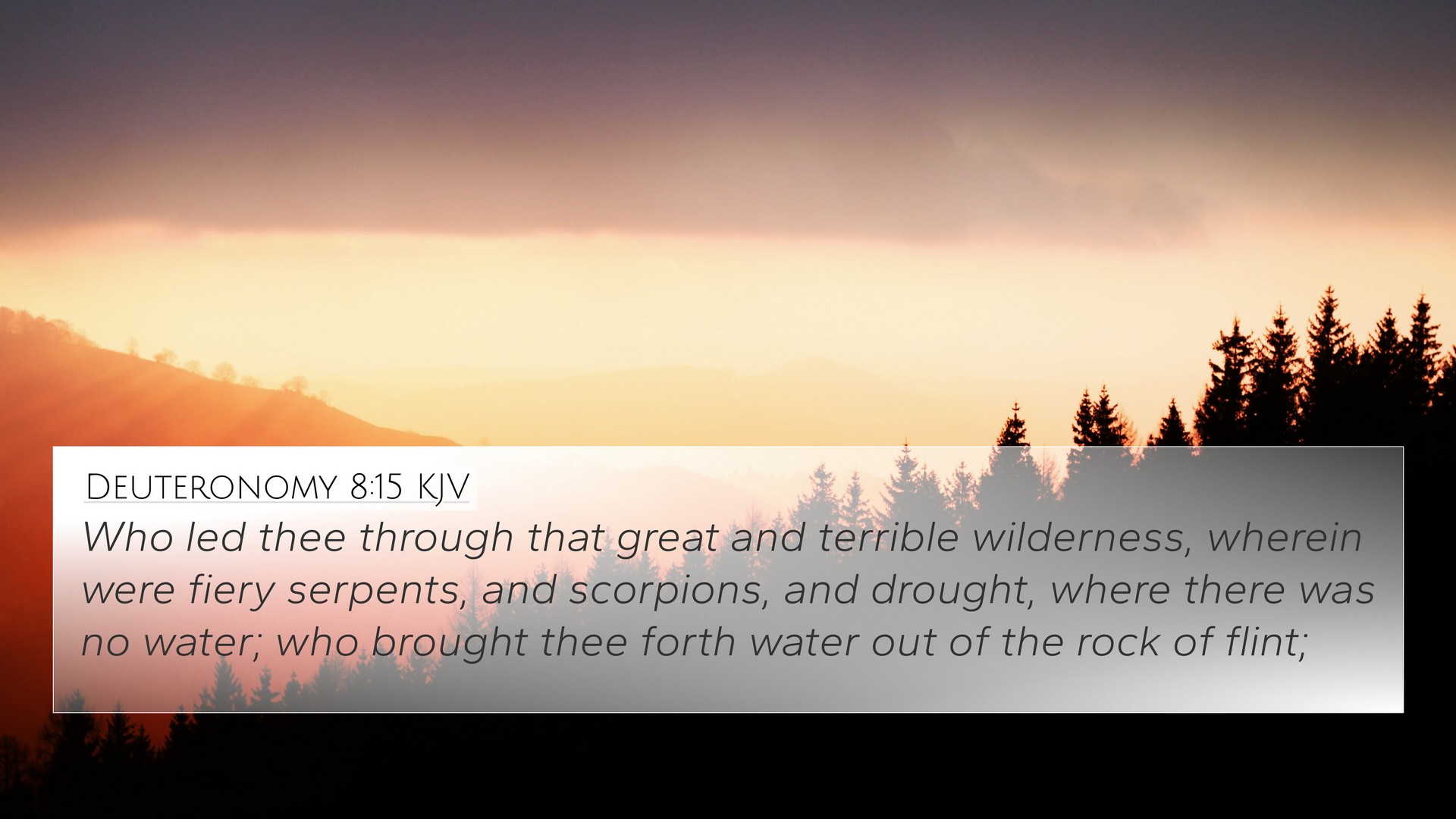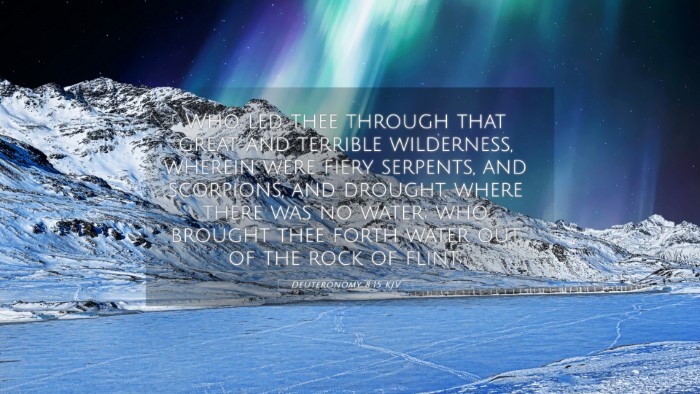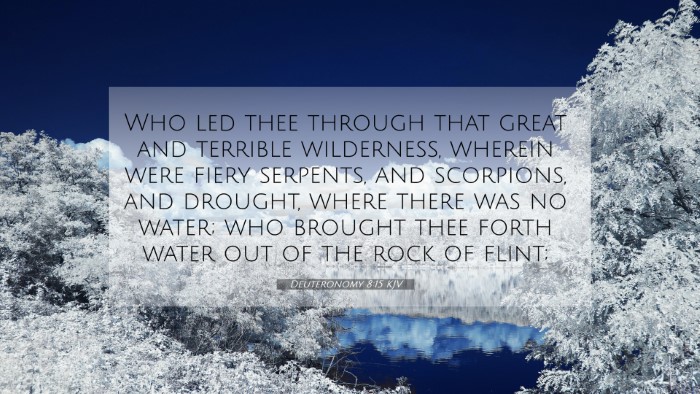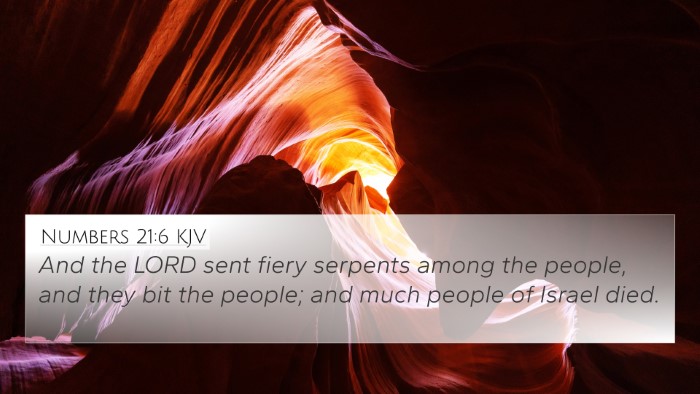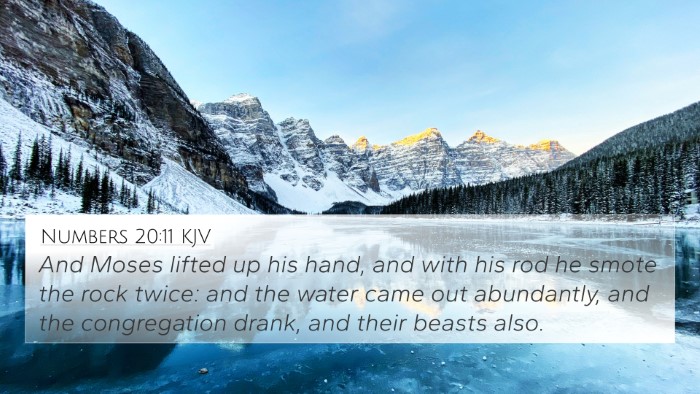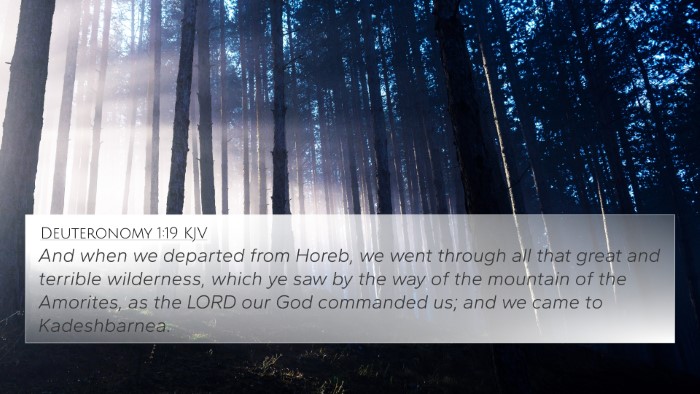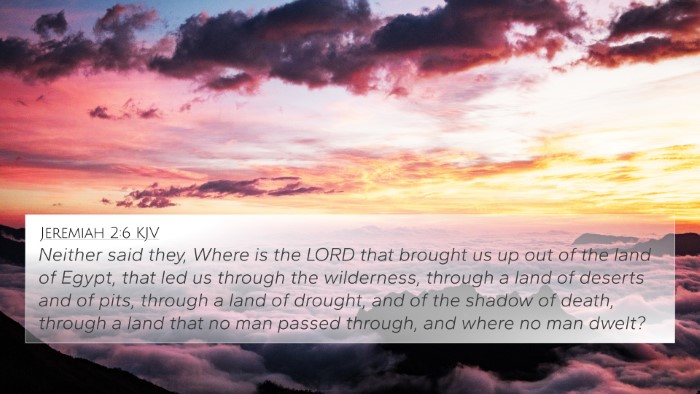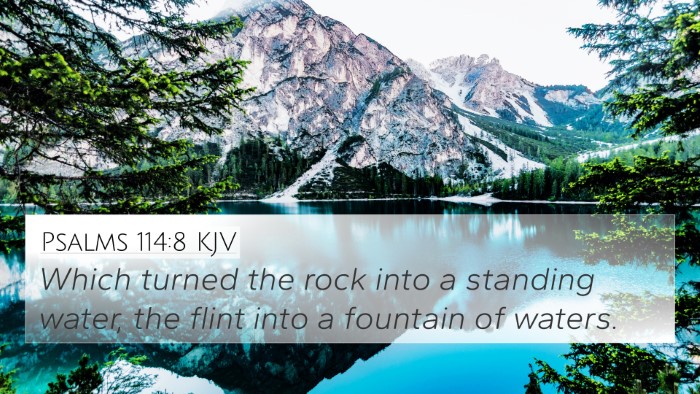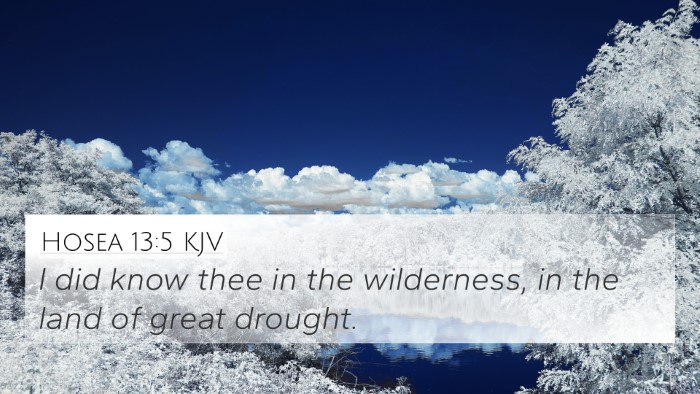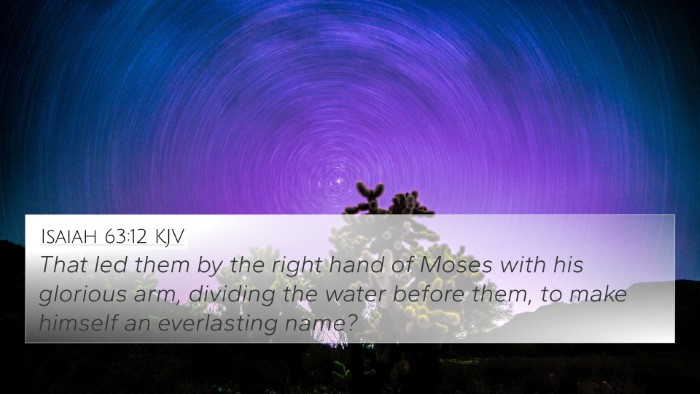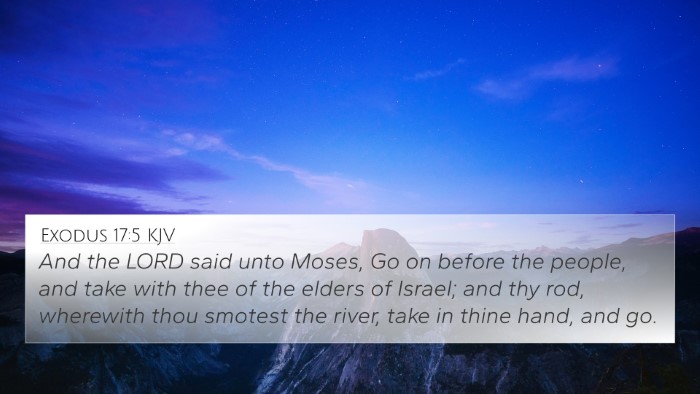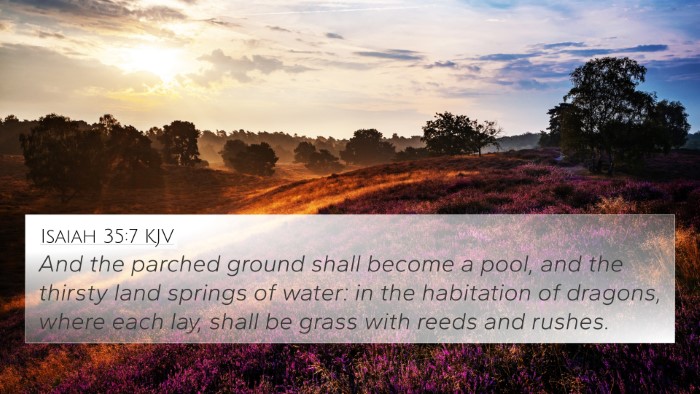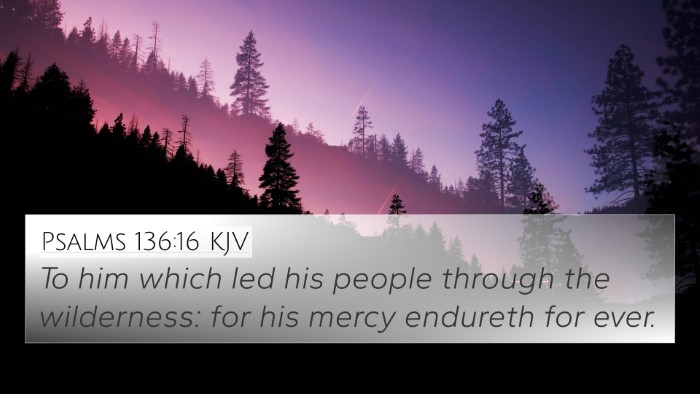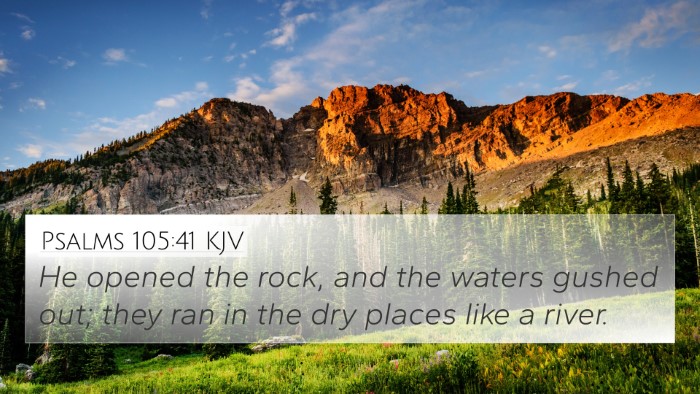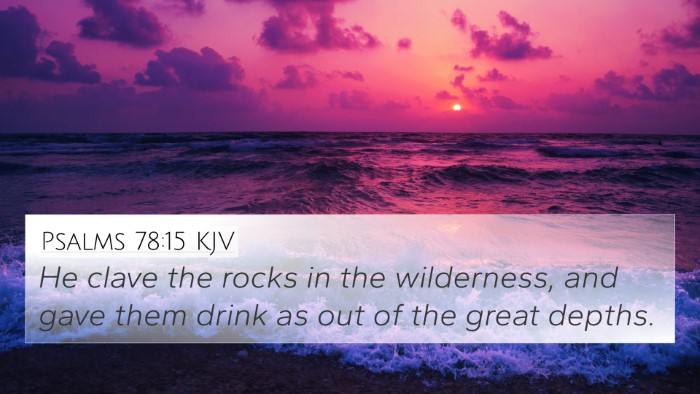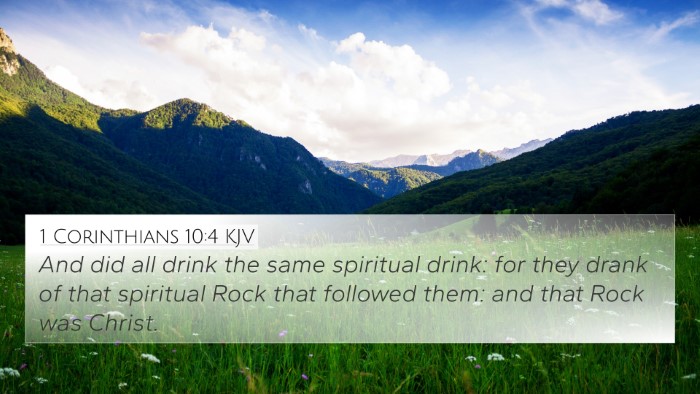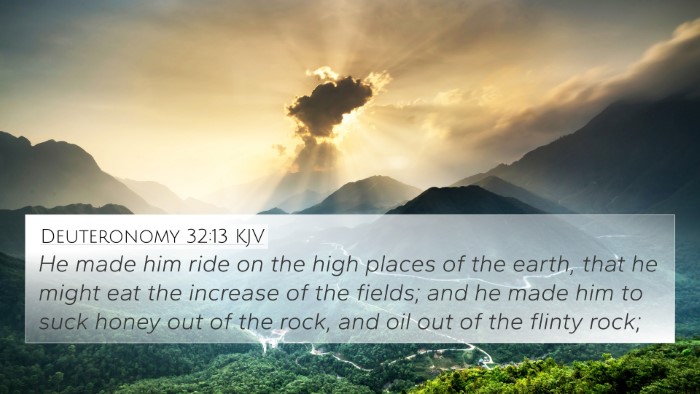Understanding Deuteronomy 8:15
Verse Text: "Who led you through that great and terrible wilderness, wherein were fiery serpents, and scorpions, and drought, where there was no water; who brought you forth water out of the rock of flint;" (Deuteronomy 8:15, KJV)
Summary of Meaning
Deuteronomy 8:15 serves as a reminder of God's providence during the Israelites' journey through the harsh wilderness. The verse highlights the dangers they faced, including venomous creatures and scarcity of resources, yet emphasizes God's power and care in providing for their needs. This verse is crucial in understanding the overarching theme of dependence on God in times of trial.
Insights from Commentaries
Matthew Henry’s Commentary
Matthew Henry expresses that God’s guidance through the wilderness was a test of faith and obedience for the Israelites. He points out that the wilderness, filled with dangers such as "fiery serpents and scorpions," symbolizes the trials believers may encounter. God not only led them through these challenges but also provided sustenance, demonstrating His faithfulness and power. Henry emphasizes the importance of remembering God’s past provisions to strengthen faith in the present.
Albert Barnes’ Notes
Albert Barnes suggests that the "great and terrible wilderness" serves as a metaphor for spiritual trials. He notes that the dangers mentioned evoke the idea of spiritual warfare that believers face. Barnes highlights the miraculous provision of water from the rock, representing Christ in the New Testament, thus establishing a link between Old Testament events and New Testament revelations. This connection is significant for understanding God's redemptive plan throughout Scripture.
Adam Clarke’s Commentary
Adam Clarke explains that the term "fiery serpents" likely refers to the acute pain caused by the bites of these snakes, paralleling the suffering caused by sin in the lives of individuals. Clarke elaborates on the wilderness experience as symbolic of the spiritual journey every believer undergoes, where one is tested and refined. The mention of water from the rock not only signifies physical sustenance but also speaks to the spiritual nourishment God provides, reinforcing the theme of divine provision throughout the Bible.
Related Bible Cross-References
- Exodus 17:6: "Behold, I will stand before thee there upon the rock in Horeb; and thou shalt smite the rock, and there shall come water out of it, that the people may drink." This passage parallels the miraculous provision of water.
- Numbers 21:6: "And the LORD sent fiery serpents among the people, and they bit the people; and much people of Israel died." This emphasizes the danger in the wilderness, as mentioned in Deuteronomy 8:15.
- Psalm 78:15-16: "He clave the rocks in the wilderness, and gave them drink as out of the great depths." This reflects God’s continued provision for His people.
- Isaiah 48:21: "And they thirsted not when he led them through the deserts: he caused the waters to flow out of the rock for them: he clave the rock also, and the waters gushed out." This connects to God's sustenance in the wilderness.
- John 4:14: "But whosoever drinketh of the water that I shall give him shall never thirst; but the water that I shall give him shall be in him a well of water springing up into everlasting life." This connects to the spiritual implications of the physical water provided.
- 1 Corinthians 10:4: "And did all drink the same spiritual drink: for they drank of that spiritual Rock that followed them: and that Rock was Christ." This links the Old Testament events to Christ's fulfillment in the New Testament.
- Philippians 4:19: "But my God shall supply all your need according to his riches in glory by Christ Jesus." This affirms God's provision for believers today.
Conclusions and Thematic Connections
The journey through the wilderness as depicted in Deuteronomy 8:15 serves as a profound reminder of faith, dependence, and God’s providential care. This verse is intricately connected with various themes throughout Scripture, making it a pivotal point for both historical and theological study. Understanding the connections between verses such as John 4:14 and 1 Corinthians 10:4 provides deeper insight into the narrative of God's salvation plan and the spiritual truths applicable to all believers.
Tools for Further Study
- Bible concordance
- Bible cross-reference guide
- Cross-reference Bible study materials
- Comprehensive Bible cross-reference resources
- How to find cross-references in the Bible through various study tools
Exploring Inter-Biblical Dialogue
Deuteronomy 8:15 acts as a crucial link in the inter-Biblical dialogue, highlighting themes of trial, provision, and God’s faithfulness. By cross-referencing associated scriptures, believers can identify a comprehensive view of God’s intentions for His people, both in the Old and New Testament. Such explorations not only encourage believers but also facilitate an enriched understanding of Scripture as a cohesive narrative.
